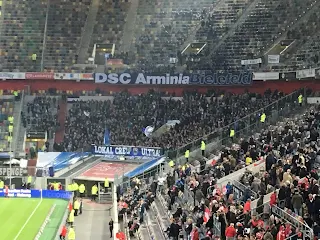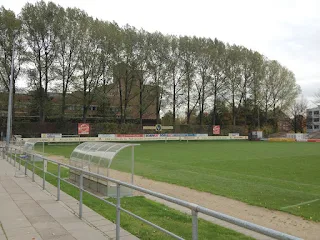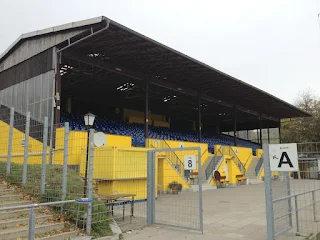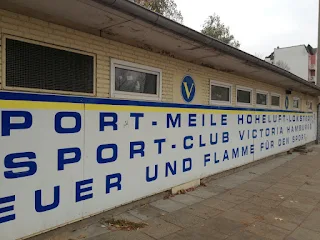Two other local clubs; Düsseldorfer Fußballklub Spielverein who were founded in 1908, and Fortuna (earlier FK Alemania) who were formed in 1911 amalgamated to form Düsseldorfer Fußball-Club Fortuna 1911 in 1913. Another club, TV Flingern joined forces to create Düsseldorfer Turn- und Sportverein Fortuna on 15 November 1919 as the club moved to a new home ground at Vennhauser Straße.
In the 1920's Fortuna began to win honours, picking up four Bezirksliga district titles and providing their first German international player; Ernst Albrecht. In 1930 the club moved grounds once again, this time to Flinger Broich or Fortunaplatz as it was otherwise called in the Flingern district of the city.
Further finals followed in 1958 and 1962. Both campaigns ended in defeat to VfB Stuttgart in Kassel and then to 1. FC Nürnberg in Hannover.
 |
| The Rheinstadion in its prime |
Fortuna were not selected as one of sixteen founder members of the Bundesliga in 1963, but they did gain a place after winning the Regionalliga West title in 1965-66 with Kuno Klötzer as head coach. However, their spell in the top flight lasted just one season.
In 1970 Fortuna returned to Fortunaplatz for a couple of seasons while the Rheinstadion was rebuilt, going on to win promotion to the Bundesliga in 1970-71, for a spell that lasted sixteen years. Third place finished came in the 1972-73 and 1973-74 seasons as Reiner Geye and Klaus Budde scored the goals for the side coached by Heinz Lucas.
The team reached another DFB-Pokal in 1977-78, this time losing 2-0 to local rivals 1.FC Köln at Gelsenkirchen's Parkstadion. On the 9th December 1978 Fortuna hammered Bayern Munich 7-1 at the Rheinstadion in the Bundesliga.
To see Bayern's largest ever Bundesliga's defeat, click here:
At the end of the 1978-79 season Fortuna embarked on a magnificent run in the UEFA European Cup Winners Cup as Universitatea Craiova, Aberdeen, Servette and Baník Ostrava were defeated to set up a final with FC Barcelona under coach Dietrich Weise.
The match in Berne was a classic encounter with Fortuna eventually going down 4-3 after extra time. Stand out players at the time were brothers Thomas and Klauss Aloffs, Bernd Zimmermann and Rudi Bommer. Thomas Aloffs and Wolfgang Seel with a brace were the scorers in the final.
To see the final, click here:
Fortuna were relegated in 1986-87, but they returned as 1988-89 2. Bundesliga champions with Sven Demandt scoring the goals for the side coached by Aleksandar Ristić. Between 1990 and 1992 the club went through a succession of coaches until the return of the Bosnian.
He was tasked with restoring top flight status after relegation in 1991-92 yet in his first year back the club dropped to the third tier Oberliga Nordrhein where the team won the 1993-94 title with Richard Cyron top scoring. Fortuna went on to promotion back to the Bundesliga the following season.
The 1995-96 Bundesliga
campaign saw the team consolidated before going back down in 1996-97. Igli Tare
scored goals but couldn’t prevent Düsseldorf from relegation to Regionalliga West/Südwest
at the end of the 1998-99 season.
League restructuring saw a move to Regionalliga Nord for 2000-01, a season that almost saw Fortuna drop down another level. However, there would be no escape in 2001-02 as Fortuna were relegated to Oberliga Nordrhein.
The club were in huge financial trouble, moving out of Rheinstadion to play at the Paul Janes Stadion as Fortunaplatz had been re-named from 1990 in honour of their former hero, with the arena also housing Fortuna Düsseldorf II. Local punk band Die Toten Hosen assisted by sponsoring the club for a couple of seasons.
Promotion to Regionalliga Nord was achieved in 2003-04 as Oberliga runners-up where the club stabilised aided by goals from Marcus Feinbier and Marcel Podszus for Uwe Weidemann’s side.
The club received a boost in 2005 as the club moved into the new LTU Arena on the site where Rheinstadion formerly stood. A third place in 2007-08 under Norbert Meier with Axel Lawaree top scoring saw Fortuna secure a place in the newly formed 3. Liga.
A runners-up spot in the inaugural season saw Fortuna go up to 2. Bundesliga thanks in part to the goals of Marco Christ. The 2009-10 season saw the team narrowly miss out on another promotion after finishing in fourth place at the re-named Espirit Arena.
After an average following campaign Fortuna started the 2011-12 season in great form, as they headed the table for some time. They eventually won promotion back to the 1. Bundesliga via a play off win over Hertha BSC Berlin. Team captain Andreas Lambertz became the first German player to be promoted three times with the same club.
However, the spell in the top flight lasted just one season as Fortuna were relegated on the final day of the 2012-13 season after defeat to Hannover 96. The relegation led to the sacking of manager Norbert Meier who was replaced by Mike Büskens who lasted just a few months before Lorenz-Günther Köstner came in after the winter break.
After another mid table finish in 2013-14 Oliver Reck came in as the new team manager. Recl lasted just one poor season before giving way to new boss Taşkın Aksoy. The managerial merry go round continued at the Esprit Arena in 2015-16 as Fortuna fought against relegation, with Frank Kramer, Marco Kurz and Friedhelm Funkel all having spells in charge of the team.
Funkel's appointment gave the club some stability as Fortuna finished the 2016-17 campaign towards the wrong end of the table, but safe from relegation. However, greater things were to come the following campaign.
The goals of Rouwen Hennings and Benito Raman, prompted by midfielder Florian Neuhaus saw Fortuna win promotion back to the top flight before sealing the title with a 3-2 away win against fellow promoted side 1. FC Nürnberg.
Fortuna Dusseldorf will play in 2. Bundesliga in the 2020-21 season.
My visits
Fortuna Düsseldorf 1 Bayern München 2 (Saturday 14th October 1989) 1.Bundesliga (att: 55,000)
I was on my first ever trip outside the UK with some pals from the Gas Club in Scarborough on a mini holiday in the Rhine Valley. We arrived in Germany on the Friday afternoon, with the coach stopping for an hour or so in Bonn for our driver Derek, to have his designated rest. Naturally enough, without further ado, we headed for a bar.
The establishment we chose had various football mementos hanging up. We managed to get through to the barman that we wanted to know the fixtures for the following day, with this been in the days before the internet and the same coverage that would later be taken as normal. It was established that the game that stood out was Düsseldorf v Munich, with Scottish international Alan McInally getting great reviews back home while starring for Bayern.
I went drinking on the Friday evening with Crusher and Kev Phillips before meeting up with the rest of the gang. Both were very keen on going to the game, so we agreed to make sure we got up and had breakfast to set us on our way. Derek, who wasn't exactly endearing us gave us the advice that we needed to travel south and across the river to Rüdesheim.
We arrived a train that got busier with fans as we approached Düsseldorf after our ride that lasted over three hours. We got a few looks as we spoke in English, but the locals were fine once they realised that we weren't Bayern fans. We followed the crowds downstairs to the trams and we were quickly on a packed service to the Rheinstadion.
We managed to work out that we needed tickets in advance, but that was no obstacle. Despite the high attendance, the stadium held 76,000 at the time. We went inside and found ourselves on the terracing behind the goal for 12DM, which was around £4 at the time.
The Rheinstadion was a beautiful venue, although not perfect for football as the pitch was surrounded by an athletics track that had hosted the 1977 World Championships. There was a continuous lower tier with terracing at each end. Above of this tier was a horseshoe shaped upper level, with the far end open. Seating occupied upstairs apart from a couple of blocks at the far end, where the Fortuna fans stood.
 |
| Me and my new friend |
Bayern began the game well on top and went ahead after just five minutes through Manfred Schwabl. Much though we were urging on the home side, they doubled their lead on thirty two minutes when Roland Wohlfarth netted.
At half time we were chatting away, when a bloke came across with a familiar accent. He turned out to be in the army based nearby, but came from Sheffield and was supporting Bayern. We had a good chat and he gave us some useful tips about the football out there.
Fortuna battled back after the break, but couldn't get a goal back immediately. We wanted to hear the noise if they did. On the hour they did get back into the game via a Klaus Augenthaler own goal. Despite the efforts of Uwe Fuchs leading the home forward line, Bayern held out reasonably comfortably to pick up an away victory.
We let the crowd drift away as we bought a bratwurst and a alcohol free beer and sat in the upper tier seats to get a better view. This allowed us to get on a tram hassle free and even get a seat. We were advised that it was best for us to change trains at Cologne on the way back by the man at the Hauptbanhof. While we were waiting for it to come along a special train full of Bayern fans went past us. I was wearing a Fortuna hat, and received dogs abuse, much to the hilarity of my pals.
We did change at Cologne, and lo and behold we caught a direct train to St Goar, where we were based. A couple of hours later we were sat in the pub having a meal and watching the highlights while drinking away. It was as well Derek didn't feel thirsty, as we ready to offer him major feedback!
The trains were very busy but many were not dressed for the game. Their destination was the exhibition centre next door. I found my way inside the entrance to the arena through the security checks. Once inside the box like structure you were free to wander round and find your particular gate.
It had been constructed to be multi purpose with a roof, although that was not allowed to be closed during Fortuna matches under league rules. The concourses had a massive selection of food, drink, sweets and souvenirs. The stadium had two tiers all the way around inside. Both ends had terracing on the lower deck.
The game was niggly in parts without anything too nasty. Fortuna were on top and Lukas Schmitz crossed from the left. Rouwen Hennings went for the header but looked as though he had missed his chance.
Click here to see the crowd scenes I recorded.
The trains were regular back into the city. I alighted at Heinrich-Heine-Allee for drinks in Aldstadt; one of my favourite European areas for nightlife. I headed for the always superb ‘Chicken Bar’ as we have christened it over the years. The regular staff were on and I got a place at the bar as it filled with revellers and returning Fortuna fans. The beer was good and music right.
After quite a long drink I finished off in the terrific Hausbrauerei Zum Schlüssel for a couple before grabbing a kebab. I took the U Bahn back to Hauptbahnhof for my train home to Oberhausen, where I got lost thinking I knew a short cut back to the City Hotel where I was staying.



























































